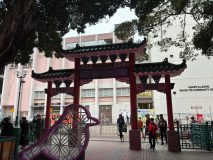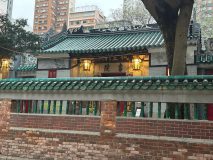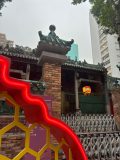



Youtube Link: https://youtu.be/E40uyEzezdU?si=u4M1R02A8-s-Zk7P
Transcript:
Tse= Tse Pui Yi Shirley 3036231253
Lai= Lai Wing Tung Oliver 3036231370
Lai: Good morning, Shirley.
Tse: Good morning, Oliver. Welcome to our podcast. Do you discover that many things are disappearing with time?
Lai: Umm…. What do you mean about disappearing?
Tse: Like the Dim Sum Trolley in tavern, the way of ordering food from waiters in restaurants, the Queen’s Pier and Mobile Softee.
Lai: Oh, I know what you mean. Many things we had already accustomed to its existence in the city have unconsciously disappeared from us. Shirley, do you remember the Tin Hau Temple near our secondary school in Yau Ma Tei? We have become accustomed to its existence but it may be demolished in the coming ten years.
Tse: That is a sad story. The Tin Hau Temple in Yau Ma Tei is the largest Tin Hau Temple in Kowloon. It is located near Chung Fong Street in Yau Ma Tei Temple Street and is now listed as a Grade 1 historic building by the Antiquities and Monuments Office.
Lai: Even a Grade 1 historic building unable to escape the fate of demolition?
Tse: Yes, the Queen’s Pier, Ho Tung Garden, and the previous St. Joseph’s Cathedral was demolished after being rated as Grade I historic buildings.
Lai: But how do you know it is vanishing?
Tse: There are many reasons that may lead to this result. The development of cities requires more land resources, and the development of new building projects, such as commercial areas, residential areas, or infrastructure, all require new land resources. However, the land resources in Yau Ma Tei are limited, and in this situation, historical sites may be seen as obstacles to development and therefore demolished for new construction.
Lai: Oh! I get what you mean. Land is a limited resource, and the Tin Hau Temple in Yau Ma Tei is located in the urban area, with higher economic value. In situations where land supply is limited, the government may prefer to use land for more economically beneficial purposes rather than preserving historical sites.
Tse: Exactly! There is another reason that contributes to this sad result. From the perspective of financial, maintaining historical sites requires a significant amount of funding and professional knowledge. However, Hong Kong is currently facing a fiscal deficit and cannot afford such expenses, so they may choose to demolish historical sites to save expensive maintenance costs.
Lai: It’s a pity to do this. I know that the Tin Hau Temple was built by fishermen who believed in the Goddess of Seafarers and was the religious center and most prosperous place in the area in the past. In the courtyard of the temple, there is an altar dedicated to Tin Hau, and there are many altars and ancestral halls on both sides to worship different gods.
Tse: I went there recently, there was a Kwun Yam Treasury Opening Festival held. Believers pray and ask to “borrow” money from the goddess of mercy Kwun Yum, praying for wealth and prosperity. We can see that today, the Tin Hau Temple is highly used for religious activities. If it is demolished, many people will be affected.
Lai: The first to bear the brunt is undoubtedly the believers. The place places great emphasis on religious activities, and there are also believers who come to worship the gods on a regular basis. The temple carries the emotions and beliefs of their followers. Demolishing the temple may cause them to lose the place for religious practice and worship, and may cause confusion and loss in their beliefs.
Tse: The second group of people might be affected is tourism. Being a landmark of Hong Kong, Tin Hau Temple is a popular tourist attraction that attracts a large group of tourists and pilgrims. The demolition of Tin Hau Temple may cause reduction of profits to local tourism. At the same time, the trading of shops and restaurants targeting tourists on the temple street next to the Tin Hau Temple will also be affected.
Lai: Yes, do you remember we went to the Tin Hau Temple and did an interview with the tourists there? They all like Tin Hau Temple because the place is nice, beautiful and quiet. They said that the environment of the temple is different from other building surroundings. The temple showed traditional Hong Kong and helped them to learn more things about Hong Kong’s local culture.
Tse: I also remember we interviewed a local person who rests in the park of Tin Hau Temple. She thinks that the environment of Tin Hau Temple is relaxing and the air quality is better there. That is a pleasant place for her to relax her body and mind. She believes that the Tin Hau Temple should not be demolished or else local people have less place to relax themselves from a stressful working environment.
Lai: Although the Tin Hau Temple in Yau Ma Tei is a Grade 1 historical building, it is not enough to protect it from the fate of demolition unless it is rated as a statutory monument. However, there is no significance done to respond to its impending disappearance. To respond, relevant individuals can advocate for the protection of the Tin Hau Temple in Yau Ma Tei and raise public awareness of its historical and cultural value. This can be promoted through media, cultural activities, and other means to attract public attention and encourage relevant authorities to take it seriously.
Tse: We hope it will stay with us longer.